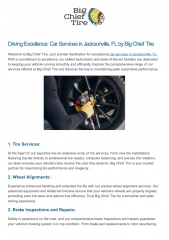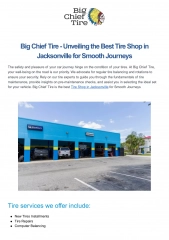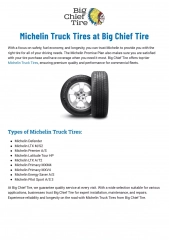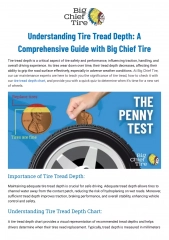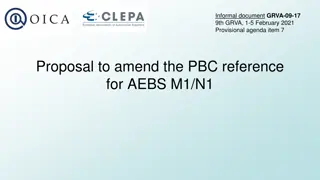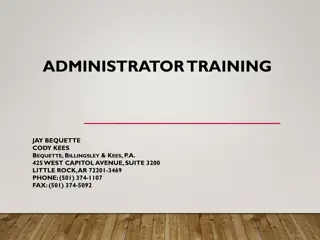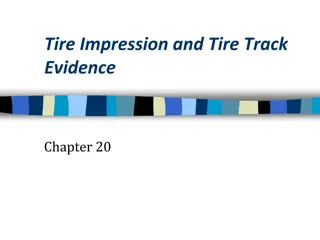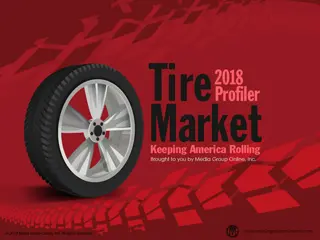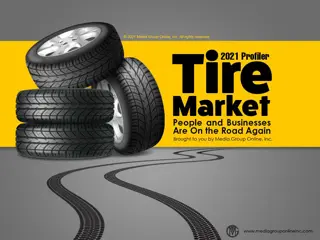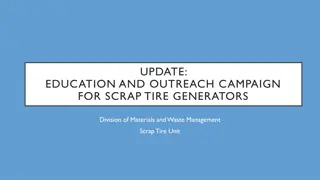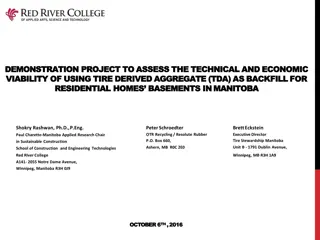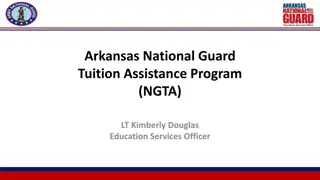Arkansas Tire Accountability Program Overview
The Arkansas Tire Accountability Program, regulated by APC&EC Regulation No. 36, aims to recycle and beneficially use used tires through rules and regulations set in Act 317 of 2017. The program focuses on managing waste tires effectively, evaluating performance and efficiency, and implementing the e-manifest system for accountability and sustainability. Key aspects include tire collection, management plans, evaluation criteria, and the importance of the e-manifest system in tracking tire activities. The program involves various team members dedicated to achieving the primary goal of tire recycling and beneficial use.
Download Presentation

Please find below an Image/Link to download the presentation.
The content on the website is provided AS IS for your information and personal use only. It may not be sold, licensed, or shared on other websites without obtaining consent from the author. Download presentation by click this link. If you encounter any issues during the download, it is possible that the publisher has removed the file from their server.
E N D
Presentation Transcript
APC&EC Regulation No. 36 Tire Accountability Program Arkansas Environmental Federation April 17, 2018
Meet the Tire Accountability Program Team Members
Tire Accountability Program Tire Accountability Program Senior Manager: Tammie Hynum Admin Analyst: K. Johnson Generators & Transporters Manager: Daniel Marks Processors & Waste Tire Sites Manager: Business Planning Manager: Everette Hatcher Scott McWilliams Admin Analyst: M. Womble Admin Analyst: C. Kent
Rules and Regulations APC&EC Regulation No. 36
General Provisions and Definitions Act 317 of 2017 Regulation 36 Primary goal of the program is to ensure Districts recycle or put to beneficial use as many used tires as possible Reg. 36: Chapters 1 and 2
Used Tire Programs Used Tire Programs (UTPs) are defined as Solid Waste Management Districts or Inter-District programs that collect and manage used tires. Must obtain an identification number for using the e- manifest system. Submit Business Plan for review and approval. Develop & Submit a Used Tire Management Plan: Name and address of all waste tire sites; Quantity of tires at each waste tire site; Owner and Operator of each waste tire site; and Schedule of implementation to abate each site. Reg. 36: Chapter 3
Performance & Efficiency Evaluations Performance indicators used by the Department in evaluating the Business Plans included: Quantity of recyclable tires Quantity of waste tires disposed in a landfill Number of waste tire sites in the district Administrative, facility, and Transportation expenses Revenue sources Number, type, and location of tire collection centers Recycling rates Reg. 36: Chapter 4 and 5
E-Manifest System Purpose: Provide accountability Provide sustainability How is this done? Requiring the use of e-manifest system for UTPs and paper manifest for tire generators. Why an e-manifest system? Provides ADEQ with an accurate reporting of all information related to collection, transportation, distribution, recycling, and disposal of recyclable tires, waste tires, and used tires culled for resale. Reg. 36: Chapter 6
Tire Generators Register with DFA Types of Tire Generators: Tire retailer Tire transporter Tire wholesaler Tire manufacturer Manufacturer of retreaded tires New or used car dealers Auto repair shop Salvage yard Reg. 36: Chapter 7
Ark. Code 8-9-401(15)(A) Tire generator means a person who: (i) Removes tires from rims for disposal or resale; or (ii) Stores used tires on or in property owned, leased, or otherwise controlled by that person. Reg. 36: Chapter 7
Tire Transporter Tire transporter is defined as a person who is in the business of or receives compensation for transferring used tires from one (1) location to another location for collection, storage, processing, recycling, disposal, reuse, or resale. Reg. 36: Chapter 7
What is required of Transporters? 8-9-411(a) On or after January 1, 2018, a tire transporter shall meet the following requirements: Obtain for each vehicle a tire transporter license and receive a tire transporter number Provide proof that each vehicle has passed an annual safety inspection Provide proof of insurance for each vehicle and authorized driver Provide a bond in the amount of ten thousand dollars ($10,000.00) Establish that each authorized driver has completed training for the used tire manifest Pay a fee of fifty dollars ($50.00) for each vehicle to be licensed Reg. 36: Chapter 7
Rim Removal Fees Starting January 1, 2018, rim removal fees are imposed upon the transaction of removing a tire from a rim that is related to the sale of a replacement tire by a tire retailer. The tire retailer will impose a rim removal fee to any person who purchases: A replacement tire for a rim that involves the removal of a different tire from the same rim; or The service of removal of a tire from a rim and replacement with a tire not purchased from the tire retailer (only if person making purchase cannot show proof of rim removal fee payment for replacement tire). Reg. 36: Chapter 8
Rim Removal Fees $3.00 for each new tire that replaces a tire removed from a rim $1.00 for each used tire that replaces a tire removed from a rim Each tire generator must: Register with DFA and ADEQ Collect fees from the purchaser Pay DFA monthly (keep 5% for administrative costs) Use the paper manifest form Reg. 36: Chapter 8
Commercial Generators and Fees Starting January 1, 2018, commercial generator fees will be imposed upon the transaction of a commercial generator selling or delivering a new tire as part of a fleet service. The commercial generator fee shall be charged by the commercial generator to a person who in the ordinary course of business is an end user that removes used tires from the rim and replaces them with new tires. Reg. 36: Chapter 9
Commercial Generators and Fees Commercial generator fee is paid to DFA: $3.00 for each new tire sold or delivered to an end user The commercial generator who collects the fee may retain 5% for administrative costs. Reg. 36: Chapter 9
Importers and Import Fees Starting January 1, 2018, import fees are imposed at a rate of $1.00 for each used tire that is imported into AR. Importers must: Be registered with DFA and ADEQ Pay monthly fees to DFA Use the paper manifest Reg. 36: Chapter 10
Disbursements Reimburse UTPs for used tire recycling and disposal costs Provide incentives for recycling used tires collected under this regulation Provide accountability for the disbursement of moneys to UTPs Improve the sustainability of UTPs Reg. 36: Chapter 11
Disbursements Disbursements are: Based on moneys available in the funds According to established rates in the approved business plan specific for each UTP According to funding priorities Level One Level Two Level Three Reg. 36: Chapter 11
Beneficial Use Requires written approval by both the used tire programs and ADEQ Regulation 36.1202 contains the Project Proposal requirements Exemptions: Project involving <500 tires for soil erosion Tire chips as leachate collection media Road construction Daily cover Reg. 36: Chapter 12
Waste Tire Sites Waste tire sites are prohibited Within a 30-day written notification from ADEQ, a person must: Provide information of the waste site including the location, size, and amount of tires Submit a written plan describing a method and time schedule for removal Reg. 36: Chapter 13
Tire Collection Centers Districts must have at least one center in each county (75 minimum state-wide) Access-controlled General Permit (Form TAP-6) Annual Report (Form TAP-5) Initial Permit Fee of $200.00 Annual Permit Fee of $50.00 General Permit good for 5 years Reg. 36: Chapter 15
Tire Processing Facilities Site-specific permit (Form TAP-4) Initial Permit Fee of $250.00 Annual Permit Fee of $250.00 If less than 500 tires in a 30-day period are processed, the owner/operator may obtain a general permit for mobile processing equipment. Initial Permit Fee of $200.00 Annual Permit Fee of $50.00 Reg. 36: Chapter 16
QUESTIONS https://www.adeq.state.ar.us/tap/



